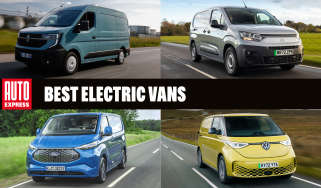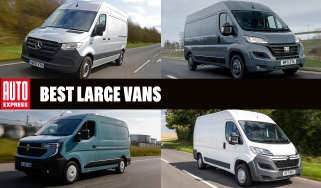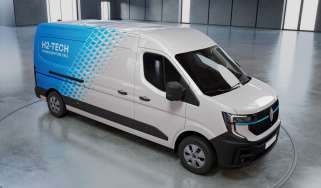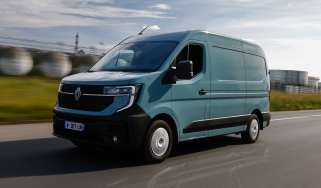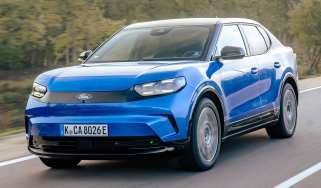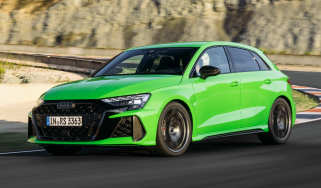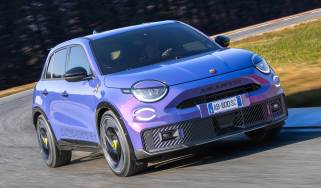New 2019 Renault Master reveals all
An in-depth look at the updates for Renault’s large van with Fleet Director Mark Dickens and LCV Product Manager Bradley Gooder
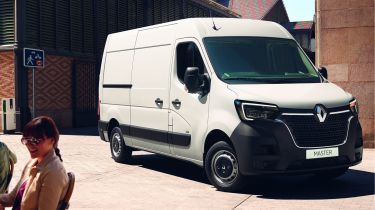
The Renault Master is a frontrunner in the large van class, but that hasn’t stopped Renault from giving it a makeover to make it even more appealing. New for 2019, the Renault Master gets a revised interior with an improved look, better connectivity, additional safety kit and more efficient engines – all whilst maintaining the Master’s impressive payload and cargo-carrying ability. We spoke to Mark Dickens, Fleet Director, and Bradley Gooder, LCV Product Manager at Groupe Renault UK, to find out more about what buyers can expect from the new Renault Master.
From the outside, the Master gets a more vertical grille and a squarer front end inspired by trucks, while the C-shaped LED daytime running lights take their influence from the Renault car range, giving the new van a familiar look.
• Renault Pro+ vans: The home of conversions
But the main focus of the Master update has been the interior, and Mark is a big fan of what the designers have done. “The cabin is much more car-like than before, and this is something that van buyers are keen to see,” he explained. “We have more tactile materials and improved trim inside, and the single dashboard colour makes it look more upmarket, while the sort of car tech we now have on board the Master is a big upgrade.”
Bluetooth® phone connectivity and DAB radio is standard across the range, while Renault’s MediaNav Evolution system is available, which allows users to hook up their smartphones and make use of Apple CarPlay® and Android AutoTM connectivity†.
There’s plenty of storage, deep door bins, a large glovebox and handy hidden storage under the twin passenger seats. In addition, the back of the middle seat folds flat to create a handy desk, turning the Master into a mobile office – a standard feature of the Business+ trim level and optional elsewhere. And for added comfort on the move, a suspension seat is now available to help drivers take the strain out of longer journeys at the wheel.
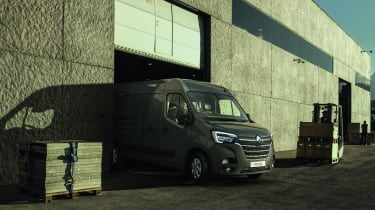
Improved safety has also taken a front seat with the New Master. “Some van users have become accustomed to having the latest safety kit in their cars, and it can be easy to forget its usefulness when stepping back into a van,” said Mark. “That’s why we’ve introduced tech normally preserved for cars into the Master.” Instead of a rear-view mirror – which isn’t much use in a panel van with a steel bulkhead anyway – the Master can be ordered with Rear-View Assist. This places a monitor where the mirror would normally be, and it has a live feed from a camera that’s mounted above the back doors. Unlike some rear-view systems that only work when you’re reversing, this system is permanently on, giving you the benefit of rearward vision at all times. Combine this with the wide-angle door mirrors and high driving position, and the Master is as easy to place on the road as a small hatchback.
Other additions which help keep you safer include side-wind assist – which counters any drifting from your lane caused by high crosswinds – lane-departure warning, blind-spot warning and active emergency braking. Also available is front park assist to complement the rear sensors “Customers are asking for this safety kit, as they take their duty of care for their drivers and the safety of other road users very seriously,” stated Bradley.
Changes under the bonnet see a more efficient 2.3 dCi twin turbo diesel engine introduced, promising fuel consumption up to 13% better* than the old model. Selective Catalytic Reduction (SCR) and the addition of AdBlue® technology also help to reduce emissions. “The New Master range conforms to the latest emissions standards and has been tested under the latest WLTP conditions,” said Mark. “But this hasn’t come at the expense of driveability, as there’s more power on offer, too.”
With up to 180hp and 400Nm of torque available with the most powerful engines, the dCi diesel is still more than up to the job of hauling payloads of up to 2.15 tonnes (licence permitting). And of course, if you want to reduce your van emissions to zero, the all-electric Master Z.E. has benefitted from the same range of updates as the diesel Master.
One thing that hasn’t changed is the Master’s ability to carry big payloads and cargo volumes. “At the end of the day, they’re vans,” Mark said. “We want to improve the drive, but the van still needs to do the job. The internal dimensions of the Master have stayed largely the same, which is important for buyers that want to upgrade from the previous generation – they need to know that their kit will fit.” This doesn’t mean that the load area has been ignored, though: additional grab handles have been included for easy entry and exit from the vehicle, whilst bright LED load area lighting is available as an option, and the Master has one of the lowest loading heights on the market.
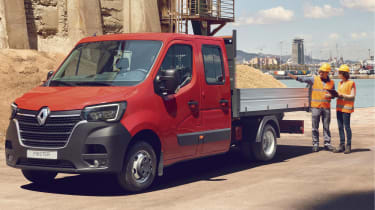
The Renault Master is available as a front-wheel-drive panel van in four lengths and three heights, as a rear-wheel-drive van in two lengths and heights, a crew van and in a number of chassis and platform-cab conversions, either via Renault’s ‘Off the Shelf’ range or a ‘Tailor Made’ solution prepared by an accredited converter. With 99 different variants on offer, there really is a Master available to suit every business requirement.
And with the benefit of the Renault Pro+ commercial vehicle dealer network at their disposal, users can be sure that their new Renault Master will be working for them for as long as possible, reducing the amount of downtime for servicing and maintenance to the shortest time.
For more information on the new Renault Master, visit renault.co.uk or your local Renault Pro+ specialist for full details.
*Comparison between Master MM35 dCi 130 & New Master MM35 dCi 135 MY19.†Standard on Sport models, optional on Business and Business+ versions. Compatibility: An iPhone no earlier than iPhone 5 & iOS 7.1, an Android 5.0 (Lollipop). Connecting a smartphone to access Apple Carplay® or Android Auto™ should only be done when the car is safely parked. Drivers should only use the system when it is safe to do so and in compliance with the requirements of The Highway Code. Drivers should be aware of the potential of hands-free technology to distract a driver’s attention from the road, preventing them from having full control of the vehicle.
